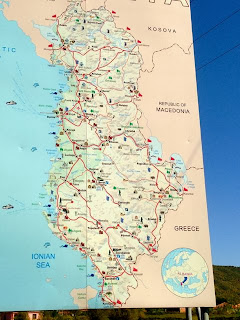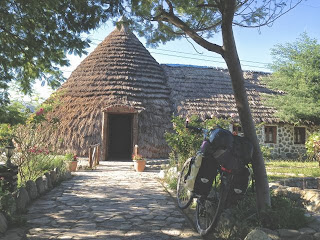From being alone, I being the only one responsible
for my actions, decisions and their consequences, my successes and failures, I am back now into the world with my
wife, children, family, friends and responsibilities. This needs some time for
adjustment and I knew this beforehand, but there is a difference of knowing it and
the real thing.
Of course during these six weeks on my own, I did not
live like a hermit. I also like company. I am not the loner type. This trip,
that didn’t give a single negative experience at all, made me realize that the
confrontation of other people from a positive point of view of trust and
wonderment without doubt and suspicion, feels good. It proofed also more
productive in getting into some form of communication, even if the spoken languages
did not match. And traveling through the Balkan as a West European this will
often be the case. This lesson, I will bring to mind after my sabbatical.
How old is 55?
The other element, I was not quite sure of, was if at my
age of 55, travel companions, hosts and people in the street you just encounter
with a question, would not find me odd, a loner on his bicycle. As far as I can
judge it by my experiences, people never gave me that feeling. Maybe that is
because on a bicycle you are so much more approachable than for instance in a
private car. Maybe because they also are astonished and curious, that could
very well be. But this expected disapproval was never there and that gave an
enormous reassurance and a lot of confidence in myself. It just was what I
hoped it to be, a social and societal adventure into countries and cultures, that I never visited before and in
which I had no experience. I consider this as another of the many treasures, I
will cherish and nourish forever.
Between disillusion
and hope
Another element of this trip, touring specifically the
former communistic countries Hungary, Slovenia, Serbia, Bosnia Hercegovina,
Montenegro, Croatia and Albania, that will stay with me is a mixed feeling, one
of hope and positivism and contrarily despair and disillusion.
I imagined myself as a young man, no job, and no
incentive from parents to educate oneself as best as possible. The further
South I came, the more you see the young men hanging around, trying to
distinguish themselves from all the others, but ending up doing all the same.
Drink a coffee and smoke like their fathers and grandfathers, being very
serious about their mobile and some about their twenty year old smoke cuffing
VW Golf. Of course they would like to work, start a family but how can they?
There are just no jobs, although there is work enough! But they can’t see –
what I see – because they lack examples, role models, a little push, some
appreciation and trust. Going abroad, as only the bravest do, doesn’t really
help, because all their energy is encountered by us in the established part of
the EU with mistrust, envy and fear. And if you are Serbian or Albanian you
can’t legally work anywhere in the EU.
But despite all this negativism there are also bright
spots of hope. I do not know if my observation is blurred by the interest in
the other sex, but it seems to be that in these societies the girls and women
are the most studious and diligent. They seem not so busy with their appearance
and their own presence amongst their peers. They seem more communicative and
open. Asking a question on the street to a young men or women made a
difference. The men more often turned me down, or told me they did not
understand me, than the women.
Of course you also meet well-educated men and
women, both eager to get ahead. Both targeted and knowing what they are or want
to be doing. But making a comparison between the young people I spoke to in
Hungary and for instance in Albania, the ones in Hungary – although with the
strong intention to work in their country – seem disappointed. They told me
they feel they can’t ‘stick their heads through the ceiling’. It’s the power
structure of the old Hungary, ruled by the clan of former communists, now often
turned into nationalists and strong believers in the status quo that pushes and keeps them
down.
In Albania there seemed to be more hope and less
disillusion. They still see a future for themselves in which their time will
come, where the Hungarians are looking abroad to at least give their enthusiasm
and energy a chance to blossom.I have no explanation for these differences in the atmospheres.
What can we do?
If we believe in the European Union as not only an economic entity, but also a pacifying and levering vehicle, bringing us all a more stable and better future, what can we do to make this a reality?
I wrote earlier that one of most successful
models to build up mutual trust, companionship and communication channels is
through person – to – person relationships at different levels of society.
Private initiatives of exchange, like teachers to teachers, schools to schools, cooperation and relationships between craftsmen, SME's, municipal workers willing
to share their experiences, are powerful tools of change. I belief that this
policy should be built up at EU-level, but without the money factor playing a
significant role. This would only attract the wrong people on both ends and
would lead to an early death, because of the killing red tape. Because ‘not
going by the book’ is one of the rules in these countries. Therefore some
flexibility and time is badly needed. Otherwise there will be smart local
politicians, banning smoking in all bars, restaurants and workplaces, according
to EU-regulations, just for the record and their shiny exposure. Still I could
not find one of these places living up to it!
The often heart argument that this would only lead to
spilling ‘our’ communal (EU) funds and to misuse, because these societies are
so corrupt, is up for debate. Our Western definition of corruption just takes
into account if something is legal or illegal. But shouldn’t the final results
of an activity – take for example the postbox constructions of the Netherlands
– not be part of the definition as well? We don’t call it corrupt, but these
tax constructions certainly do not appreciate the losses to our national budget.
These revenues never become part of it, because we allow some firms these legal
constructions. But for me that’s just as corrupt as we tend to stamp the
societies of the Southern parts of Europe and the Balkans with. This is not a
plea to keep intact the nepotism, the arbitrariness, the insecurity of legal
protection of basic human rights, like freedom of speech and sexual
orientation. On the contrary, this should change, but the question is
how can we do this most effectively, efficient and are we willing to look
critically at our own ingrained and established methods and instruments?
TO BE CONTINUED!































